In the midst of COP27 and as Europe-wide energy crisis BDFI seed-corn funding recipient Dr Ola Michalec describes how, as a social scientist, she has helped energy policy makers open up dialogue around of smarter energy systems through illustrations. In partnership with Bristol City Council, Ofgem and Energy Systems Catapult and communication and illustration experts she is helping to move the debate from the purely technical to social imaginings.
Winter is coming
We are at the cusp of winter, gearing up to spend more time indoors. As soon as the clocks returned to Greenwich Mean Time, basking in late-October sunlight seemed like a distant memory. To create a sense of homely “hygge”, I’ve recently completed a bi-annual reshuffle of the storage boxes. Christmas decorations, candles, and blankets have swapped places with beach hats, sandals, and camping gear. I’ve yet to put heating on, however. The biggest contributor to wintry cosiness comes at the highest cost, especially this year.
This sentiment resonates across the country, as individuals and businesses alike are nervously budgeting for the upcoming months. With so many complex questions arising, I’m grateful to the scientists and journalists for their excellent outreach and science communication. “Why has the price of gas increased?”, Rebecca Leber asks? “Who is profiting from my expensive bills?”, Graeme Demianyk explains. “How to effectively target those at the highest risk of fuel poverty?”, Prof Aimee Ambrose discusses.
The value of futures-thinking
With most of the public attention is directed to examining today’s crises, sometimes it might be challenging to imagine that many of us in the wider energy sector are working towards a greener, happier, and fairer future. Indeed, as a social scientist interested in emerging technologies, I occupy a peculiar space where the present and the future(s) meet.
At first, buzzwords like “open energy data”, “energy digitalisation” or “smart homes” might seem irrelevant to the current issues concerning energy affordability, sustainability, and security. Although emerging technologies will not help with our heating bills this winter, these seemingly futuristic visions of the “new power grid” are closer than we think. Various best practice guidance documents, standardisation proposals or regulatory consultations have sprouted over the UK energy policy landscape over the past several months. This is precisely why now is the best time to broaden the community of stakeholders and raise the important questions about the social implications of introducing novel energy technologies into our homes and infrastructure sites.
Meaningful participation of community organisations and citizens is critical for timely advancement of climate action (Stirling, 2008; Rommetveit et al, 2021). Infrastructures and policies, if introduced without the public approval, risk becoming delayed or rejected (see, for example, the troubling case of smart meters implementation programme – Michalec et al, 2019; Sovacool et al, 2017). However, engaging the lay public with complexity and autonomy of modern digital (or ‘smart’) systems has been proven challenging due to pre-requisite knowledge expected from the citizens (Pfotenhauer et al., 2019). Recently, scholars of energy systems and society argued for a participatory research agenda on energy systems digitalisation (Sareen, 2021 ). A paper co-authored by a fellow Bristol University researcher, Dr Caitlin Robinson, suggested five areas of further analysis and engagement: 1) the intersection of digital and financial inclusion; 2) social implications of flexibility 3) the role of trust in shaping engagement with innovations; 4) digital literacy and communications; 5) the uneven impacts of innovation on different social groups (Chambers et al., 2022).
Our research: on regulating smart energy appliances
In parallel to that, my research at the University of Bristol, explored the role of expertise in standardisation and policymaking initiatives in the context of smart energy (Michalec et al., in review) systems. We found that while there are numerous initiatives to facilitate the introduction of smart energy systems, they are usually framed as solely ‘technical’ projects which provide limited opportunities for engagement with citizens and community advocacy groups. However, security, privacy, and interoperability of energy data are inherently socio-technical considerations that necessitate opening up of the public debate.
Smart lens: Sketching new perspectives on energy systems
Thanks to seed-corn funding from Bristol Digital Futures Institute, we were able to fund a project exploring illustration as a medium of public engagement in energy futures. First, we assembled a team of researchers (Dr Ruzanna Chitchyan and I), an illustrator (Oliver Dean), a science communication expert (Dr Emma Osborne) and industry partners (Bristol City Council, Ofgem and Energy Systems Catapult). Second, we worked collaboratively to produce briefs for the artist. Third, we engaged in several rounds of sketching and feedback until we reached a version we were all happy with. Et voilá! Let me introduce you to a few of our illustrations (you can find a full set here).
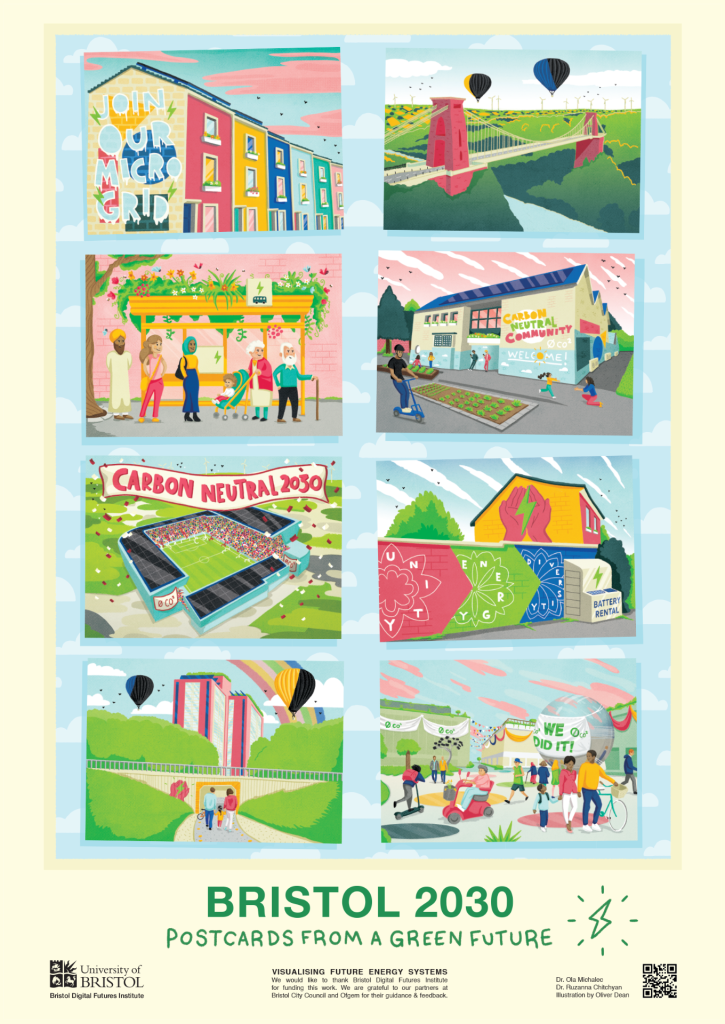
This is a series of eight images (available as postcards or a large poster) depicting digital energy innovations in several iconic Bristol locations: from Ashton Gate Stadium, Millennium Square to Easton Community Centre, among the others. We wanted to show a variety of communities celebrating sustainable, inclusive, and optimistic futures. While most of media reporting focuses on scaremongering and fatalistic accounts, we created images that could be used as conversation-starters for more hopeful discussions. Our postcards were displayed during an exhibition in We The Curious earlier this year.
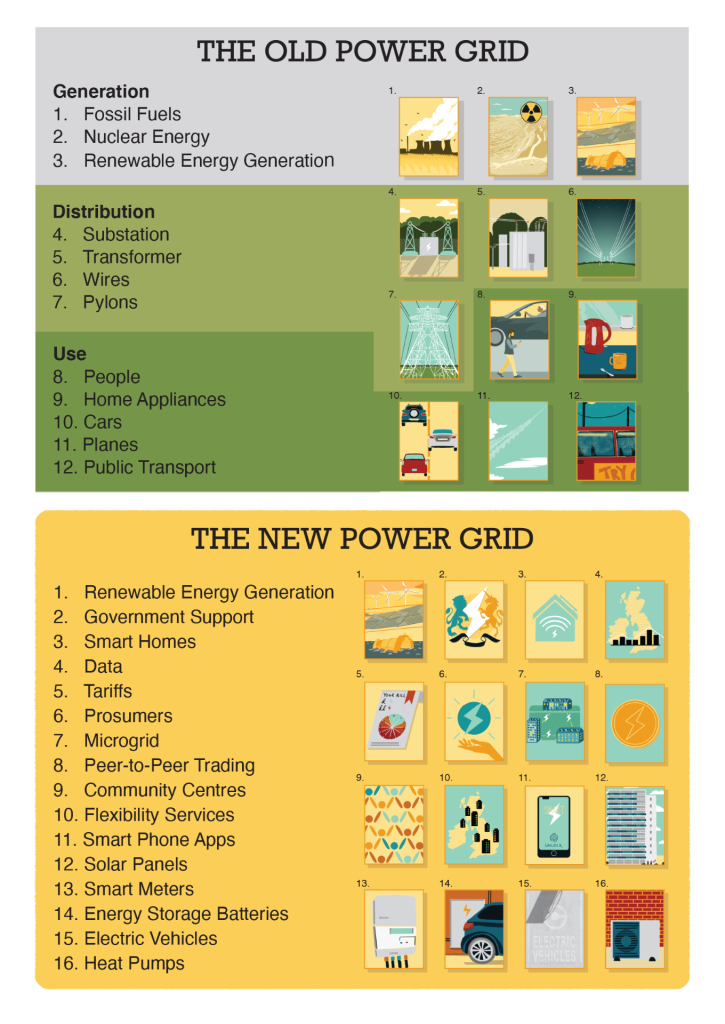
Old grid/ New Grid is a prototype card game. With 28 images representing technological, social, and regulatory aspects of the energy systems, we designed a structured activity for schools and community energy organisations. So far, we have received interest from organisations such as Bath and West Community Energy Cooperative and are always keen to hear from other potential collaborators!
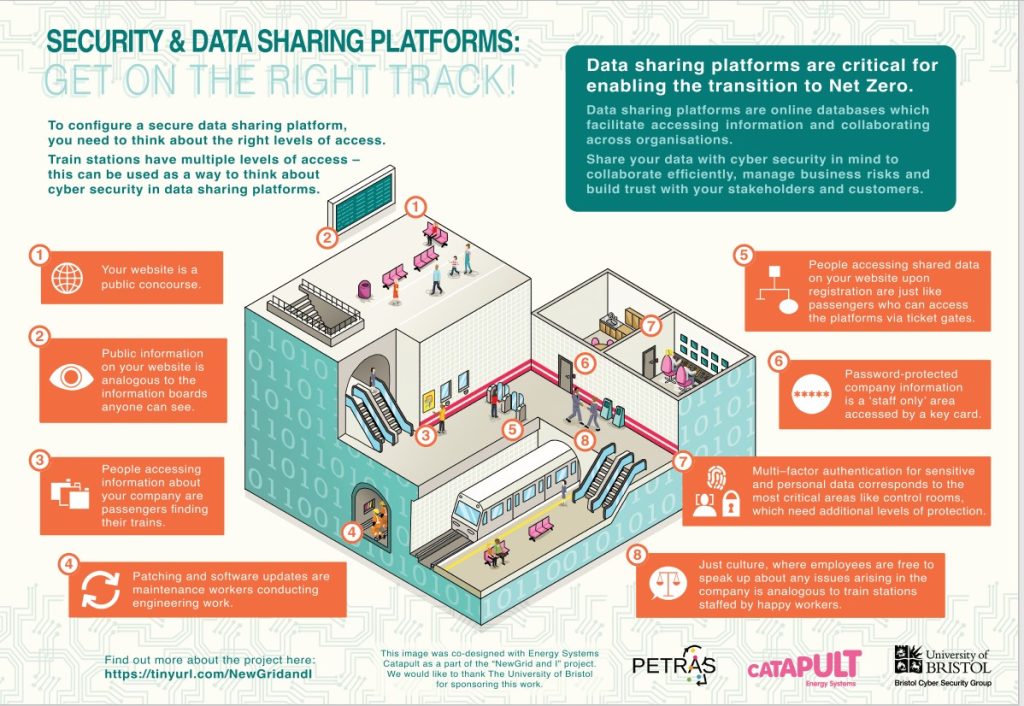
One of our project partners, Energy Systems Catapult, requested an attractive infographic aimed at people working in the energy sector without background in cyber security. Energy Systems Catapult is a supporter of the Open Data paradigm in the industry but faced difficulties with communicating it in an accessible way, while resolving misunderstandings around security and privacy. We came up with a metaphor of a tube station to show that open data is about re-considering who should access various information, rather than publishing all datasets freely accessible websites. The infographic is now used for Catapult’s onboarding workshops and other events.
What’s next?
Public engagement is never a ‘finished job’ – there are always new stakeholders to meet and new issues to discuss. That said, as researchers, we often tend to side-line these activities; it is difficult (if not impossible!) to directly demonstrate impact (echoing my reflections on policy engagement for the Cabot Institute blog). What would a measure of impact look like in this case anyway? A number of people who wrote to their MPs about sustainable energy, who threw soup at a painting in Tate, who attached solar panels to their cats? While I am not planning on tracking any of the above, let me tell you about our future plans…
- I’ll be presenting a lunchtime talk for the REPHRAIN National Research Centre on Privacy, Harm Reduction and Adversarial Influence Online on the 17th Nov 1-2pm (see image for joining instructions). I will be discussing “Using creative methods to engage people in cyber security conversations”
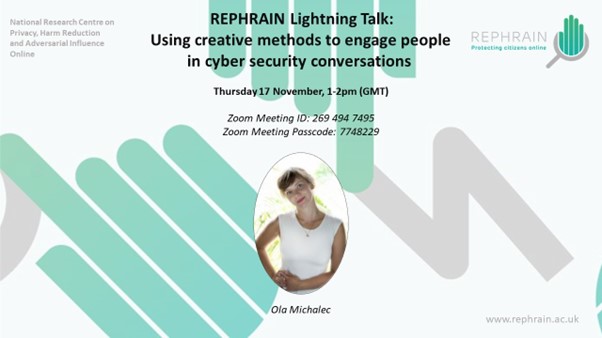
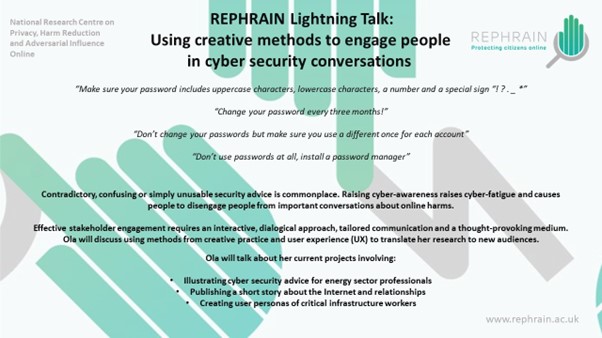
- I am preparing a public engagement workshop using our wonderful “postcards from Bristol 2030”. This will be an interactive, local, and open event aimed at all Bristolians (whether native or adopted) interested in sustainable futures of the city. Time and place TBC
- I would love an opportunity to exhibit the images – perhaps in your city or your community? Please let me know if you could introduce me to relevant people! Contact me.

